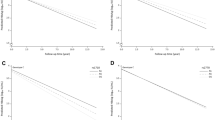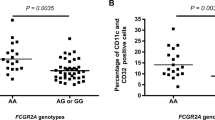Abstract
The human major histocompatability complex (MHC) genes encode the human leukocyte antigens, which are important in antigen presentation and regulation of CD8+ and CD4+ T cells. Response to therapies in hepatitis C virus (HCV) infection is highly variable (30–80%) and lower response rates have been reported among African Americans (AA; ∼30%) compared to Caucasian Americans (CA; ∼50%) infected with genotype-1 viruses. We evaluated whether MHC gene variants were associated with response to therapy and racial differences in AA and CA sustained virologic response (SVR) rates. We genotyped alleles at 8 MHC loci: 3 class I (A, B and C) and 5 class II (DRB1, DQA1, DQB1, DPA1 and DPB1) loci in 373 individuals (179 AA and 194 CA) with genotype-1 HCV infections, who were treated with peginterferon-α-2a and ribavirin. We observed carriage of A*02 (RR=1.33(1.08–1.64); P=0.008), B*58 (RR=1.84(1.24-2.73); P=0.002) and DPB1*1701 (RR=1.57(1.09-2.26); P=0.015) to be associated with SVR after adjustment for other predictors of response. In analysis of AA and CA subgroups separately, we observed potential, though not statistically significant, differences in these MHC associations. Variation in the immunogenetic background of HCV-infected individuals might account for some observed variation in viral-specific immunity and courses of disease. In this regard, future studies examining broader patient populations are warranted.
This is a preview of subscription content, access via your institution
Access options
Subscribe to this journal
Receive 6 digital issues and online access to articles
$119.00 per year
only $19.83 per issue
Buy this article
- Purchase on Springer Link
- Instant access to full article PDF
Prices may be subject to local taxes which are calculated during checkout
Similar content being viewed by others
References
Alter MJ . Hepatitis C virus infection in the United States. J Hepatol 1999; 31 (Suppl 1): 88–91.
Armstrong GL, Wasley A, Simard EP, McQuillan GM, Kuhnert WL, Alter MJ . The prevalence of hepatitis C virus infection in the United States, 1999 through 2002. Ann Intern Med 2006; 144: 705–714.
Fried MW, Shiffman ML, Reddy KR, Smith C, Marinos G, Goncales Jr FL et al. Peginterferon alfa-2a plus ribavirin for chronic hepatitis C virus infection. N Engl J Med 2002; 347: 975–982.
Manns MP, McHutchison JG, Gordon SC, Rustgi VK, Shiffman M, Reindollar R et al. Peginterferon alfa-2b plus ribavirin compared with interferon alfa-2b plus ribavirin for initial treatment of chronic hepatitis C: a randomised trial. Lancet 2001; 358: 958–965.
Conjeevaram HS, Fried MW, Jeffers LJ, Terrault NA, Wiley-Lucas TE, Afdhal N et al. Peginterferon and ribavirin treatment in African American and Caucasian American patients with hepatitis C genotype 1. Gastroenterology 2006; 131: 470–477.
Howell CD, Jeffers LS, Cassidy W, Reddy KR, Hu S, Lee JS . Peginterferon alfa-2a and ribavirin for chronic hepatitis C genotype 1 infections in black patients: safety, tolerability and impact on sustained virologic response. J Viral Hepat 2006; 13: 371–376.
Jeffers LJ, Cassidy W, Howell CD, Hu S, Reddy KR . Peginterferon alfa-2a (40 kd) and ribavirin for black American patients with chronic HCV genotype 1. Hepatology 2004; 39: 1702–1708.
Singh R, Kaul R, Kaul A, Khan K . A comparative review of HLA associations with hepatitis B and C viral infections across global populations. World J Gastroenterol 2007; 13: 1770–1787.
Kondo Y, Kobayashi K, Kobayashi T, Shiina M, Ueno Y, Satoh T et al. Distribution of the HLA class I allele in chronic hepatitis C and its association with serum ALT level in chronic hepatitis C. Tohoku J Exp Med 2003; 201: 109–117.
McKiernan SM, Hagan R, Curry M, McDonald GS, Kelly A, Nolan N et al. Distinct MHC class I and II alleles are associated with hepatitis C viral clearance, originating from a single source. Hepatology 2004; 40: 108–114.
Jeffery KJ, Siddiqui AA, Bunce M, Lloyd AL, Vine AM, Witkover AD et al. The influence of HLA class I alleles and heterozygosity on the outcome of human T cell lymphotropic virus type I infection. J Immunol 2000; 165: 7278–7284.
Tang J, Tang S, Lobashevsky E, Myracle AD, Fideli U, Aldrovandi G et al. Favorable and unfavorable HLA class I alleles and haplotypes in Zambians predominantly infected with clade C human immunodeficiency virus type 1. J Virol 2002; 76: 8276–8284.
Cruz E, Vieira J, Almeida S, Lacerda R, Gartner A, Cardoso CS et al. A study of 82 extended HLA haplotypes in HFE-C282Y homozygous hemochromatosis subjects: relationship to the genetic control of CD8+ T-lymphocyte numbers and severity of iron overload. BMC Med Genet 2006; 7: 16.
Lazaryan A, Lobashevsky E, Mulenga J, Karita E, Allen S, Tang J et al. Human leukocyte antigen B58 supertype and human immunodeficiency virus type 1 infection in native Africans. J Virol 2006; 80: 6056–6060.
Sharp ER, Barbour JD, Karlsson RK, Jordan KA, Sandberg JK, Wiznia A et al. Higher frequency of HIV-1-specific T cell immune responses in African American children vertically infected with HIV-1. J Infect Dis 2005; 192: 1772–1780.
Zavaglia C, Martinetti M, Silini E, Bottelli R, Daielli C, Asti M et al. Association between HLA class II alleles and protection from or susceptibility to chronic hepatitis C. J Hepatol 1998; 28: 1–7.
Rosen HR, Weston SJ, Im K, Yang H, Burton Jr JR, Erlich H et al. Selective decrease in hepatitis C virus-specific immunity among African Americans and outcome of antiviral therapy. Hepatology 2007; 46: 350–358.
Golden-Mason L, Klarquist J, Wahed AS, Rosen HR . PD-1 expressin is increased on immunocytes in chronic HCV and predicts failure of response to antiviral therapy: race-dependent differences. J Immunol 2008; 180: 3637–3641.
Mack SJ, Jani AJ, Geyer LN, Erlich HA . Using the reverse line strip system for studies of human diversity. 13th IHWS Technology Joint Report. In: Hansen JA (ed). Immunobiology of the Human MHC: Proceedings of the 13th International Histocompatibility Workshop and Conference, Vol I. IHWG Press: Seattle, WA, 2007, pp 291–294.
Mack S, Sanchez-Mazas A, Single R, Meyer D, Hill J, Dron H et al. Population samples and genotyping technology. Tissue Antigens 2007; 69: 188–191.
Yee LJ, Tang YM, Kleiner DE, Wang D, Im K, Wahed A et al. Myxovirus-1 and protein kinase haplotypes and fibrosis in chronic hepatitis C virus. Hepatology 2007; 46: 74–83.
Pritchard JK, Stephens M, Donnelly P . Inference of population structure using multilocus genotype data. Genetics 2000a; 155: 945–959.
Pritchard JK, Stephens M, Rosenberg NA, Donnelly P . Association mapping in structured populations. Am J Hum Genet 2000b; 67: 170–181.
Zou G . A modified poisson regression approach to prospective studies with binary data. Am J Epidemiol 2004; 159: 702–706.
Acknowledgements
This clinical study was a cooperative agreement funded by the NIDDK and co-funded by the National Center on Minority Health and Health Disparities (NCMHD), with a Cooperative Research and Development Agreement (CRADA) with Roche Laboratories, Inc. Grant numbers: U01 DK60329, U01 DK60340, U01 DK60324, U01 DK60344, U01 DK60327, U01 DK60335, U01 DK60352, U01 DK60342, U01 DK60345, U01 DK60309, U01 DK60346, U01 DK60349 and U01 DK60341. Other support: National Center for Research Resources (NCRR), NIDDK Intramural Program (TJL), National Cancer Institute, Center for Cancer Research, General Clinical Research Centers Program Grants: M01 RR00645 (New York Presbyterian), M02 RR000079 (University of California, San Francisco), M01 RR16500 (University of Maryland), M01 RR000042 (University of Michigan) and M01 RR00046 (University of North Carolina). Additional support for Dr Leland J Yee was provided by a National Institutes of Health Clinical Research Career Development Award Grant 1KL2 RR024154-02.
Author information
Authors and Affiliations
Consortia
Corresponding author
Additional information
Supplementary Information accompanies the paper on Genes and Immunity website (http://www.nature.com/gene)
Supplementary information
Rights and permissions
About this article
Cite this article
Rhodes, S., Erlich, H., Im, K. et al. Associations between the human MHC and sustained virologic response in the treatment of chronic hepatitis C virus infection. Genes Immun 9, 328–333 (2008). https://doi.org/10.1038/gene.2008.21
Received:
Revised:
Accepted:
Published:
Issue Date:
DOI: https://doi.org/10.1038/gene.2008.21
Keywords
This article is cited by
-
Importance of Host Genetic Factors HLA and IL28B as Predictors of Response to Pegylated Interferon and Ribavirin
American Journal of Gastroenterology (2011)
-
Intracellular expression of IRF9 Stat fusion protein overcomes the defective Jak-Stat signaling and inhibits HCV RNA replication
Virology Journal (2010)



